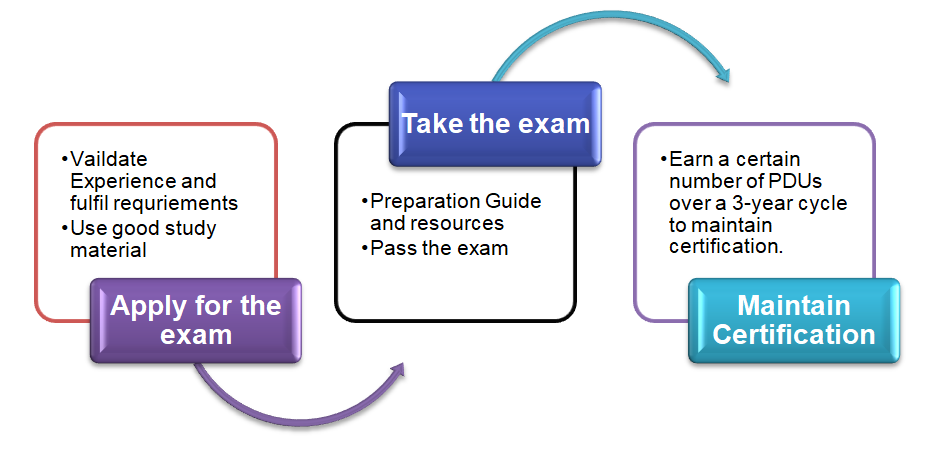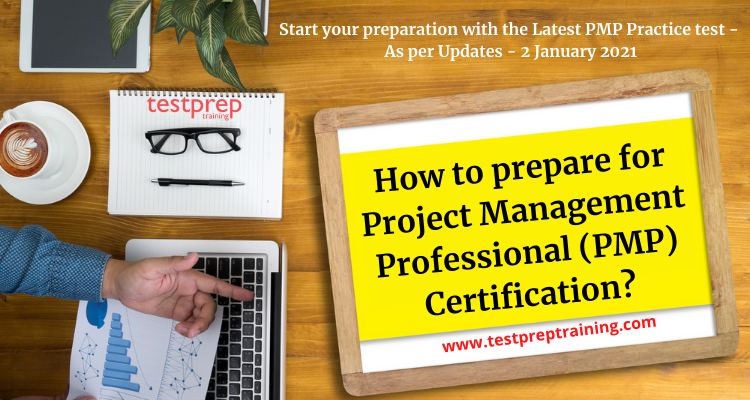If we look at the way to stay in the topmost position in today’s market globally then the answer is Project management. That is, many companies and businesses have started turning to project management to consistently deliver better results. Thus, this has increased the demand for certified Project managers for good roles. Related to this, the one certification that is designed by PMI for project managers to prove themselves globally is Project Management Professional (PMP) certification. Getting PMP certifications provides value in front of employers to show that you have the required skills and knowledge to manage the projects. Moreover, PMP even applies to those who are not in the project manager role but want to help in bringing the project to its completion.
But, to get successful in this, it requires seriousness and commitment to achieving a goal. Therefore, there is a need to have good exam preparation to crack the exam and get certified. For PMP certification, the exam pattern is quite different from other exams and requires a lot of effort. So, in this blog, we will talk about how to successfully become PMP certified and its exam pattern including the major requirements and other details. But before that, you must take a look at the importance of project management certification. In order to know how hard is PMP exam, it is equally important to dive deep and understand the exam completely.
Understanding Project Management
Project management covers everything from managing individual projects to overseeing a bunch of projects and even the big picture of an organization’s projects. Certifications in project management are made by experts in the field and are based on what really works in the real world. Having these certifications on your resume is valuable and means you can work in any industry, anywhere, and with any project management method.
Using project management for everything a company does can help it save money, work more efficiently, make customers and stakeholders happier, and compete better with others. That’s why more and more companies are putting time, money, and effort into having good project management throughout their organization.
Do you know? There are over a million people worldwide with a PMP certification. These certified professionals can earn up to 25% more than those who aren’t certified in project management.
PMP Certification: Exam Overview
Getting a PMP certification is valuable for your career because it shows you have the skills and experience employers want. It helps project managers prove they know how to manage projects well. Professionals with a PMP certification are in a good position to lead project teams and make sure projects succeed.
Role of a Project Manager
As an experienced project manager they must meet the requirements that include –
- First, they should be able to do their job with some supervision and handle everything about the project from start to finish.
- Second, they lead teams made up of different experts to get projects done on time, within the budget, and with the resources available.
- Lastly, they prove they know what they’re doing by using a method on projects that have clear requirements and goals.
There are a lot of project management professional jobs available with tremendous opportunities. But, becoming a project manager is not going to be an easy task. In other words, there are certain PMP certification requirements that you need to complete before applying for the exam. Before that, in the below section we will check the basic exam details for the PMP.
- Firstly, the PMP exam is associated with the Project Management Professional Certification.
- Secondly, the exam time duration for the exam will be 230 minutes
- The number of questions in the exam will be 180 that can be multiple choice or multiple response types.
- Fourthly, the PMP exam is available in the English language. But, there are fourteen other languages in which you can give the exam.
- The cost of the exam for PMI members is USD $405 and for non-members, the exam cost is USD $505.
- Lastly, the exam is valid for three years.
Project Management Professional Qualifications
In order to earn the PMP Certification, it is important to make sure you meet the given sets of Project Management Professional Certification Requirements –
- A four-year degree
- 36 months leading projects
- 35 hours of project management education/training or CAPM Certification
— OR —
- A high school diploma or an associate’s degree (or global equivalent)
- 60 months leading projects
- 35 hours of project management education/training or CAPM Certification
Project Management Professional Exam Outline
People in project management need a wider range of skills and ways of doing things now. The outline for the Project Management Professional Exam changed on January 2, 2021, to match these needs. It now has three new areas of focus:
Domain I – People (42%)
- This domain consists of total 14 tasks including, Manage conflict, Lead a team, Support team performance, Empower team members and stakeholders. Together with ensuring team members/stakeholders are adequately trained as well as building a team, address and remove impediments, obstacles, and blockers for the team. Further, you will learn about Negotiating project agreements, collaborate with stakeholders, and building shared understanding. Also, you will learn to engage and support virtual teams, Define team ground rules, Mentor relevant stakeholders as well as Promote team performance through the application of emotional intelligence.
Domain II – Process (50%)
- Th Second domain consists of 17 tasks including executing project with the urgency required to deliver business value, Manage communications and assess and manage risks. Moreover, you will learn to engage with stakeholders, plan and manage budget, resources and schedule. Togetherwith, planning and managing quality of products/deliverables, and scope. Further, you will learn to Integrate project planning activities, manage project changes, plan and manage procurement and artifacts. Also, you will determine appropriate project methodology/methods and practices. Then, you will also be responsible to establish project governance structure, as well as manage project issues. You must also ensure knowledge transfer for project continuity as well as plan and manage project/phase closure or transitions.
Domain III Business Environment (8%)
- In the last and final domain, you will learn to plan and manage project compliance, – Evaluate and deliver project benefits and value. Moreover, you will be required to evaluate and address external business environment changes for impact on scope and support organizational change.
Steps to Prepare for the PMP Certification Examination
In the growing project management world, many top companies, businesses, and organizations are applying this to get benefits. As a result, they are looking for certified project managers to hire with professional skills and abilities. But, not everyone can achieve that role, it requires a lot of effort, time, and hard work. PMP candidates have to spend 35 hours or more preparation for the exam. But, it is also necessary to have good study material and study plans to maintain a flow and complete the syllabus on time. Related to this, below there are methods and areas provided on which you can focus on during the preparation time. Let’s take a look at those.

Create a Study plan
For achieving PMP certification it is important to prepare for the exam as you are preparing for the project. That is to say, you need to create a plan accordingly covering all the tasks and concepts that will help you pass the PMP exam. This study plan will help you with maintaining a steady flow and to create a timeline. In these sessions, divide your topics and tasks into smaller parts and work on them sequentially. Also refer, PMP Project Management Professional Exam Study Guide
Mastering the exam concepts
Understanding the concepts for the PMP exam is an essential part of studying for the exam. There are various domains that include tasks provided with the required skills and knowledge you should have to get perfection in that. Moreover, going through these domains will give you a high-level idea of what all get covered as part of the exam. For Exam updates visit – Certified Project Management Professional Official Guide
Online Training
For PMP exam the Project Management Institute’s Registered Education Providers (R.E.P.s) are organizations approved by PMI that offer Project Management Professional Training. PMI started to accredit training providers to establish a global network of quality education providers to help hundreds of thousands of PMI Project Management Professional (PMP) credential aspirants and credential holders. However, this training will provide good study material and best practices that will help in passing the PMP exam.
Reviewing PMBoK Guide
For the PMP exam, the best-recommended study guide is the PMBok Guide. This study guide provides every essential knowledge about project management by showing the relationship between areas and process groups with processes. This includes tables that a PMP aspirant can draw 5 minutes before the exam onto an empty sheet of paper so that they can use it as a reference in answering their 180 exam questions.
Project Management Professional PMP handbook
PMBOK Guide – Sixth Edition (PMBOK 6th Edition)
Practice Tests for the exam
Practice tests help a lot during the preparation by working as an indicator of your readiness to take the exam. Moreover, taking the Pmp Project Management Professional Practice Tests help candidates to assess themselves and identify the weakest part in project management. After taking the tests, review the results, and work on the area that you score the least to improve. However, to get access to the tests, there are many providers out there offering PMP Project Management Professional Practice Tests
Join study group
Being part of a good study group can be really helpful when you’re getting ready for the exam. It’s a great way to get help with the areas you’re finding tricky and to help others with their challenges too. This helps you learn more and sharing your project management experiences can make it easier to tackle those tricky scenario-based questions on the PMP certification exam.
Final words
When you begin preparing for the PMP certification exam, remember that it shows your dedication to a project management career. It proves your skills and can boost your worth in the industry. The PMP certification is highly respected and can benefit you in various fields. Many professionals aim for it to advance their careers and increase their salaries. One of the main reasons is the steadily rising income for project management professionals.
Moreover, as a certified PMP you will be able to contribute to the organization’s strategies with well-adapted and executed project management principles. PMP certification will help you get global recognition. So, prepare well for the exam and get advanced in this. All the best and stay safe!
Learn and advance your Project Manager skills. Pass the Project Management Professional (PMP) exam Now!



